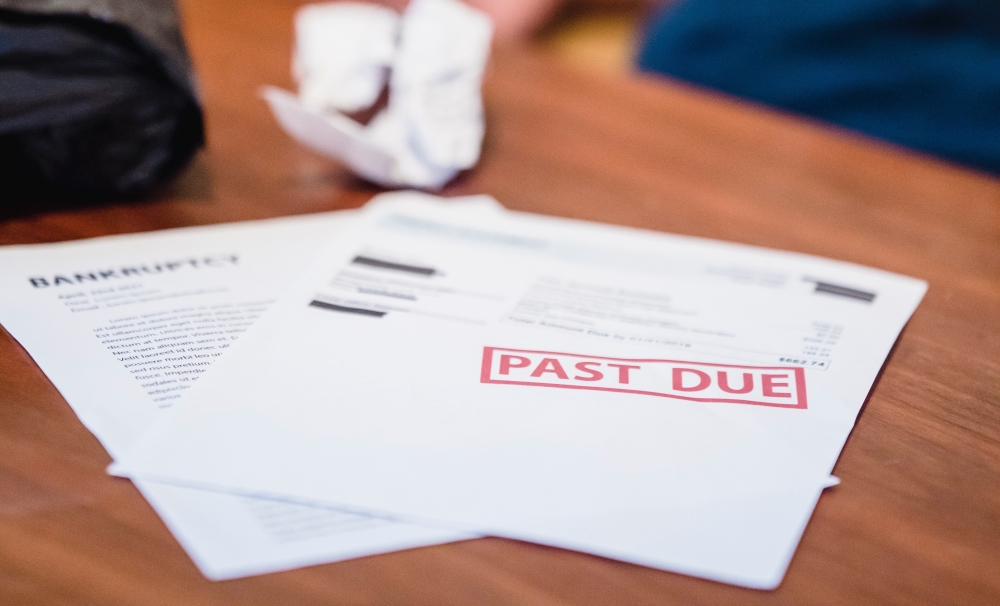Does Liquidation Affect My Credit Rating?
Since the pandemic, many directors have had to make the tough decision to close their limited companies. Liquidation and company closure can be a minefield, and it’s often the same questions that get asked. For example, one common question is: does liquidation affect my credit rating? In this blog, we will answer that and provide company directors with some tips for entering liquidation to try and ensure that nothing comes to bite you on the behind down the line.
The thought of having to close your company can be stressful enough without the idea that the company closure will affect your personal credit score or lead to personal liability for some or all of the company debts. Liquidating a limited company, in most circumstances, will have absolutely no bearing on your personal credit rating and won’t appear on your personal credit report either.
When you set up a limited company, you protect yourself personally as it is a separate legal entity. This means that should the company fail, you have limited liability protection. If a limited company becomes insolvent, the unsecured debts are written off and included in the liquidation. Unsecured debt includes corporation tax, VAT, PAYE, business rates, Bounce Back Loans, and CBILS.
In contrast, a sole trader has little protection and, therefore, a higher personal risk when the business fails and must be closed. Sole traders may face a loss of personal assets.
Once a limited liability company is placed into liquidation, your duties as a director will end, and the liquidation does not appear on your personal credit file. This means it should not affect your personal credit rating.
Be aware that unsecured debts will only be written off in liquidation if you have acted responsibly as a director. Find out more about a director’s duties.
When could a liquidation affect my personal credit rating?
There are a couple of examples where a liquidation could affect your personal credit file. It’s important to seek professional advice if you are worried about any of these aspects. The sooner you get advice, the better. If you’re wondering, can a director buy company assets? Read our blog.
Here are some things you need to be mindful of when entering a liquidation process.
Personal Guarantees
Sometimes a director is required to sign a personal guarantee on behalf of the limited company. This could be for a company loan, credit card, or with certain suppliers. A personal guarantee means that if a company enters liquidation, the director becomes personally liable to pay back the business debt.
Most lenders and suppliers are happy to restructure the debt, which gives you additional time to pay it off. However, if you do not make any attempts to pay the company debts, then the lender will seek to enforce the personal guarantee, and this will impact your personal credit score and potentially appear on your credit file. Most lenders just want their money back and will renegotiate the debt into another loan.
Wrongful trading
Wrongful trading can involve several things, such as preference payments, continuing to trade when insolvent and more. Insolvent companies cannot afford to pay company debts when they fall due. Once your business becomes insolvent, your duties as a director change and your goal is to ensure that your creditor’s positions are not made any worse.
The consequences of wrongful trading can be severe. The best way to avoid accusations is to contact a licensed insolvency practitioner as soon as you notice that you’re having financial difficulties.
Here are some examples of wrongful trading:
- Building up large HMRC arrears.
- Continuing to trade while insolvent.
- Knowingly taking credit from suppliers.
- Taking deposits from customers without the hope of providing the product or service to them – this is bordering on fraudulent trading, which has serious consequences.
- Not keeping up-to-date company accounts.
- Paying off your director’s loan before others (preference payment).
Overdrawn Directors Loan Accounts
If you have an overdrawn director’s loan account when you go into liquidation, then the insolvency practitioner will look to recover this loan from you as it is classed as a company asset. You have borrowed money from the company, and once the company is closed, it needs to be paid back.
In most circumstances, you should be able to negotiate a settlement with the insolvency practitioner on your overdrawn directors’ loan account and agree on a time scale to repay it.
If you cannot repay any of the money or renege on an agreement to repay it, then the liquidator could take legal action to recover the debt. This can lead to bankruptcy which would affect your personal credit rating and appear on your personal credit file.
You must ensure that your insolvency practitioner looks into your director’s loan before you appoint them. If they fail to do so, you may be chased for the business loan later down the line. The practitioner is duty-bound to recover these funds, as they are an asset of the company and should be used to pay back your company’s creditors.
An overdrawn director’s loan must be dealt with at the beginning of the liquidation and not later. You will be much more likely to strike a deal now than you will be at a later date.
How can I check if I have an overdrawn directors loan?
You can check if you have an overdrawn directors loan by looking at your last set of full accounts. Sometimes, the loan is featured in the debtor’s section, and other times it may be within the company’s assets section. It may be labelled as a ‘director’s current account’.
Many businesses find their accounts are outdated, so we recommend requesting a final set of accounts from your accountant so you can evaluate the situation clearly.
Fraudulent Bounce Back Loan Applications and Bounce Back Loan Misuse
No personal guarantee was required from business owners who applied for a bounce-back loan. Instead, directors just had to declare several things on the application.
When making the application, you had to self-certify the following:
- The business was not insolvent in December 2019.
- The business had been negatively impacted by Covid-19.
- The business was engaged in trading activity.
- The business had not already applied for a bounce-back loan through another bank.
- The loan must only provide an economic benefit for the company and was not for personal use.
Bounce-back loan fraud can include applying for the wrong amount – a falsified turnover, or using the money for personal use. The money had to be used for the economic benefit of the company. If you have committed bounce-back loan fraud, you could be made personally liable to pay the loan back. If you fail to do this, it could negatively impact your personal credit rating and appear on your credit file. You will face legal action if bounce-back loan fraud is uncovered.
10 things to remember when going into liquidation
- When you enter liquidation, the company will cease to exist in its current form – it will be removed from the Companies House register.
- If you decide to start the business again, in most cases, you will be restricted from using the same name. There are options, but you must seek advice about this.
- You may have to repay any overdrawn directors loan account – check whether you owe the company money before appointing a liquidator.
- There will be a thorough investigation into your director’s conduct – have you acted responsibly?
- Lenders will call in personal guarantees – you may be able to strike deals where you pay over time.
- You may find it more difficult to get credit for a new company
- Your company’s employees will be made redundant.
- While a company liquidation doesn’t affect your credit rating in most cases, it is publicly available information.
- Check if you have made any preference payments before liquidating.
- If you have failed in any of your director’s duties, you may be held responsible for some or all of the company’s debts.
What to do if you are worried about company liquidation and your credit rating
If you are concerned that your business may have to seek insolvency advice and your personal guarantee will be called in, take advice early.
Are there any rescue or recovery procedures that we can use to get the company back on a firm financial footing? If it is the end of the line for your company in its current guise, then you must have a plan for dealing with personal guarantees during a formal insolvency process.
Our experts provide director-focused advice to help you reach the most appropriate solution for your business. We hope this article has helped you better understand how a company liquidation could affect your credit rating.
Liquidation & Credit Rating FAQs
How long does the negative impact of liquidation last on a credit rating?
A liquidation will likely be on a credit file for six years. However, it is worth remembering that a limited company liquidation will not go on your personal credit score. This is because limited companies are a separate entity to you personally.
Can a person rebuild their credit rating after liquidation?
Your personal credit score should not be affected by liquidation unless you have failed to meet the terms outlined in a personal guarantee. But yes, if your credit rating is affected, it can be rebuilt.
Are there any alternatives to liquidation that have a less severe impact on credit rating?
There are some alternatives that may be less severe and can allow the company to continue in one way or another. These options include the following.
- Company voluntary arrangement (CVA)
- Administration
- Debt restructuring
There are advantages and disadvantages to each of these options. You should seek professional advice before taking any action. 1st Business Rescue can support you, offering honest advice that gets you the best outcome.
Can I get a mortgage if I have liquidated a company?
Yes, mortgage providers look at a range of factors to decide how much they can offer you. Your company liquidation will only affect your credit score if you have failed to meet the terms of your personal guarantees. If your credit score does go down, it doesn’t mean you most definitely can’t get a mortgage, it could mean that you can borrow less.
Does bankrupting your company affect your credit score?
In some cases, yes, bankrupting your business can affect your credit score. This can happen to those who receive a CCJ (County Court Judgement). Get in touch with us to discuss the aftermath of bankruptcy.
I'm Chris Worden, Managing Director at 1st Business Rescue. With over 7 years of experience, I help UK directors navigate the complex world of UK corporate insolvency. We offer free and independent advice to UK directors and advise them about what options may be available to them if their limited company starts to struggle.
I am passionate about helping other directors overcome their business challenges and get back on their feet, as I was once in the same position as them. I had a business that became insolvent, and the advice out there was confusing and overwhelming. I am here to provide honest and valuable advice to UK directors.
I am proud to say that we are one of the only 5-star corporate insolvency companies on Trustpilot with hundreds of 5-star reviews, and we publish videos weekly on our YouTube channel. Our channel is designed to educate UK directors about insolvency and debt advice. Check it out here:
Please get in touch and we’ll come back to you
without delay.
Call 0808 506 2246
Text 07717 738 167
Complete a Free Online Enquiry






